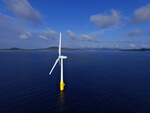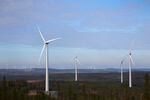News Release from GlobalData
Wind Industry Profile of
Middle East renewables surge as energy transition accelerates, says GlobalData’s MEED
According to the company’s latest report, ‘Middle East Energy Transition’, there were no contract awards for oil-powered or gas-fuelled power stations in the Middle East and North Africa (MENA) region in the first half of 2021. However, in the same period, there a number of renewable energy project contract awards in the region, worth roughly $2.8bn.
From 2017 to 2020, the average value of contract awards for oil- or gas-fuelled power stations in the MENA region was around $4.8bn a year, with $6.2bn of conventional thermal power plant contract awards made in 2020.
Richard Thompson, Editorial Director of GlobalData’s MEED, comments: “The stalling of the development of conventional power generation plants in the region is one consequence of an acceleration of efforts to reduce greenhouse gas (GHG) emissions and to diversify the energy sources away from oil and gas. Doubts about long-term demand for oil products and growing confidence in the cost effectiveness of renewable energy are also fuelling the region’s energy transition.”
Renewables on the rise
Some $104bn-worth of renewable energy projects are planned, of which roughly $21.5bn are at the contract tendering stage and are likely to lead to contract awards in 2021 and 2022.
Thompson adds: “Of the remaining $82.4bn of planned projects, only around $4.1bn are at an advanced stage of design, with the vast majority, some $78.3bn of projects, still under study. Many of these may not go ahead or could change substantially in scope.”
According to MEED’s report, Saudi’s $18bn renewables projects pipeline offers the best prospects, with some $13bn of renewable energy projects at or close to the tendering stage. The UAE, which far outstrips Saudi Arabia in terms of installed renewable capacity, has only $370m of renewables projects at the bidding stage.
Green hydrogen
The report identifies hydrogen fuel as an important emerging element in the Middle East’s energy landscape. The use of hydrogen fuel in electricity generation emits only water vapour and no carbon dioxide. Moreover, hydrogen can help decarbonise traditional gas-fired power plants.
Thompson notes: “The hype surrounding hydrogen, and in particular green hydrogen, has become increasingly hard to ignore as it dominates industry discussions of oil and gas, renewable energy, mining and climate change. The opportunity to pivot to green hydrogen is particularly strong in the MENA region.”
An estimated $42bn-worth of green hydrogen-related projects are being planned across the MENA region – and project announcements have become increasingly frequent over recent years. These announcements include both high-level memorandums of understanding (MoUs) comprising studies that are expected to lead to concrete project opportunities in the future, and agreements related to a specific project with general details on the type, location and capacity of the planned facilities.
Energy transition
Thompson adds: “Energy transition is now among the highest policy priorities for the Middle East’s oil producers, which have been hard hit by low oil prices since 2015 – a knock that may be exacerbated by the decline in oil demand growth that is predicted by 2040.”
- Source:
- GlobalData
- Author:
- Press Office
- Link:
- www.globaldata.com/...
- Keywords:
- GlobalData, Middle East, renewable energy, project, pipeline, conventional power plant, region, oil, gas, contract, award, investment, construction

























